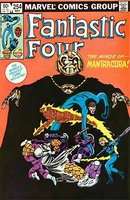 My favorite era of Marvel comics were the ones published in the early-to-mid 1980s. The Stern/Buscema Avengers stories! Byrne's Fantastic Four, Miller's Daredevil, Zeck's Captain America, Simonson's Thor! Marvel Handbooks! More great stuff!
My favorite era of Marvel comics were the ones published in the early-to-mid 1980s. The Stern/Buscema Avengers stories! Byrne's Fantastic Four, Miller's Daredevil, Zeck's Captain America, Simonson's Thor! Marvel Handbooks! More great stuff!There was certainly books from both Marvel and DC that came out after those periods that In enjoyed, but in terms of broad cross-title appeal, those two periods are my favorites. Why do you suppose that is?
In large part, it's mostly about when I first encountered them. Despite being born in 1972, the first comics I came across were not actually ones directly from the newsstands, but from a friend of my parents who gifted me a stack of books he had from a few years earlier. (The details of this are pretty well lost, but I think it was mostly a way to keep a very young boy occupied while the grown-ups were trying to talk.) So despite being into the back half of the 1970s, the very first comics I read were ones that were about as old as I was. Had my first comics been brand new ones, I expect my favorites would veer more towards the late '70s. Not a huge difference in many ways, but I certainly would have missed many of the more pointed social justice type stories that were starting to push boundaries in the early part of the decade. I think a lot of that content wound up sliding over into direct market materials, and there was a somewhat more saccharine version of the DC universe by the end of the decade.
In fact, it was those types of stories that essentially sent me over to Marvel. After reading and re-reading those early '70s books, I eventually would go out to start buying books off the spinner racks. And they seemed lackluster. There was no edge to them. At least in any of the books that had heroes I knew. It was only when my parents bought me some Marvel books (probably not knowing there was a difference -- I sure didn't at the time) that I saw a lot of expanded possibilities in comic stories. As it happened, this was in the early '80s when it was Marvel's turn to put out some edgier material. I was old enough by then to understand and appreciate depth, nuance, and subtlety; and many of those classic Marvel books at the time used them. It wound up being my first encounter with comics that weren't just kiddie stuff.
I mention all this because, when I saw the late '80s and early '90s shift to a different type of style (stereotypically embodied by Liefeld's leather jackets, pouches, and conveniently out-of-panel feet) I didn't care for that as much. Because it wasn't what I saw when I was first drawn to the books. The stuff that I did most enjoy in the '90s were the books that still were developed in that 1980s vein -- Paul Ryan on Fantastic Four or Ron Lim on Silver Surfer. Despite reading a boatload of X-Men books in the '80s, they shifted significantly enough in the '90s that I didn't care to follow them at all.
The same holds true in the '00s and '10s. I was seeing less and less of the types of comics that I found so entrancing in my youth. And the ones I did find were again the ones that harkened back most closely to that style of storytelling. The Busiek/Perez Avengers. The Waid/Weiringo FF. I tended to pick up a lot of Tom Brevoort-edited books because I noticed that he choose creative teams from more of that older school style.
Here's the thing, though. Everybody is like that. They don't all like the same things I do, obviously, but their favorites are the generally the ones the closely align with the first comics that they enjoyed. There's a whole generation out there now whose first comics were Youngblood and WildCATS. And it's that type of material -- not necessarily those characters, but the type of stories and storytelling those books used -- they're going to respond to most positively today. The closer current titles align with those structures, the more people who grew up on that material will be drawn to it.
That's not to say that we should be simply repeating the same styles and stories over and over again, but I think it's well worth remembering when you find yourself in a discussion with someone over what they do and don't like in comics. Odds are that many of your disagreements ultimately stem from the fact that they simply came into comics at a different time than you did.






0 comments:
Post a Comment